- Home
- Lisa Wingate
Good Hope Road Page 5
Good Hope Road Read online
Page 5
“It’s that bad?” I tried to picture it in my head. “Dear Lord, Weldon, how can that be?”
Weldon was too tired to mince words. “The armory is about the only building left standing in town. Doc Howard and I set up a field hospital there, but a vet and a pharmacist aren’t much of a substitute for a real doctor. We’ve got a couple of EMTs from the Hindsville Volunteer Fire Department, and we’re doing the best we can to take care of folks until we can get them to a real hospital. The park out at the lake was full of campers here for the music festival. There’s no telling how many people are hurt out there.”
“My Lord,” I whispered. I wanted to wrap Weldon in my arms and curl him in my lap like I did when he was a little boy, so I could protect him from all that was happening. “My Lord. I’ll get my clothes on and come help.”
“No, Mama,” he snapped, starting toward the door with the blankets. “Just stay here, all right? It’s black as pitch out there—no lights on anywhere in town and rubble everywhere. You just stay here and help Janet take care of the kids. You’d be in the hospital if we could get you there.”
I felt my hackles rise. “Ain’t nothing wrong with me.” It’s a terrible thing to have your own children talk to you like you’re an infant. “I’m fine.”
“Just stay here,” he barked, heading toward the door. “There’s nothing you can do in town, and …” He paused as a voice came over the radio on his belt. He pressed it to his ear, trying to make out the words, then clipped the radio back on his belt and turned toward the door in a hurry.
“Weldon, what’s going on?” I tried to get out of bed to go after him, but my body was heavy as lead.
“One of the sheriff’s deputies has found a medical doctor. At least that’s what I think he said. The man was trying to beat it out on the backroads to the interstate as the storm came in, and his car got stuck in the mud. Been stranded at one of the flooded low-water crossings all night, somewhere out past Good Hope Road. The deputy’s going to try to get through the crossing at Ataberry and bring the doctor back to town.” He combed his hair from his face, his eyes flickering in the lamplight. “Pray they make it, Mama. We need a doctor. Now.”
CHAPTER 4
JENILEE
The image of Nate hovered in the doorway as I drifted awake in the gray predawn light. Drew stood beside him, not smiling, just watching, his eyes not blue and sparkling like Nate’s, but dark like Daddy’s, brooding, sad, angry.
I blinked hard, and the images faded like smoke, weaving in and out of the faint glow from the windows.
I thought about the last time Drew came home, after he got out of the army four years ago. The year before Mama died.
He came while Daddy was gone hunting and Mama was at work, trying to make it through the day even though she was sick from chemo. Drew stayed just long enough to get the boxes of his stuff that were stored in the barn. No one would have seen him at all if I hadn’t ditched school that day.
He greeted me as if I were someone he didn’t know and didn’t want to know, as if he hated me as much as he hated that house and Daddy.
“Hey, Jenilee,” he said, standing in the doorway with his ball cap pulled low over his eyes. He looked over his shoulder at his truck, wanting to be gone from there, as if staying in that house any longer would bring it all back. There was a girl sitting in his truck, staring across the pasture at my grandparents’ old house.
Drew looked at the matted orange carpet between us, the ball cap shielding his face. “How’s things?”
“O.K.,” I said, then plopped on the couch and opened up a soda.
“You still in school?”
“Um-hmm.”
“Doin’ good?”
“O.K. I missed a lot last semester, but I’ll still graduate next year, I guess. Mama had to have another surgery and chemo.” I watched closely for his reaction, trying to gauge whether he cared. If he did, he didn’t show it. He just crossed his arms over his chest and looked over his shoulder at the truck again. We stood there in silence.
Finally he said, “I heard Nate’s been ditchin’ school. That’s darned stupid. Twelve-year-old kid shouldn’t be ditchin’ school. I’m gonna talk to him about it.”
“I don’t think it’ll do any good. They kicked him out of middle school football for his grades, and he says he isn’t going back.”
Drew tipped his face upward and gave me a hard look through Daddy’s dark eyes, so black you couldn’t see anything in them. “Probably won’t.”
“I don’t blame him.” I don’t know why I said it, maybe just to tick Drew off, because it hurt me that he didn’t care at all about Mama, that he was five years older than me, a grown-up, yet I was the one stuck home taking care of Mama, when I was only seventeen. “He’s making four-fifty an hour tax-free, helping put in sod for Shad Bell’s daddy’s construction company. Shad got him on there. Shad said he could get me on there filling out construction invoices in their office.”
Drew’s eyes flashed the way they used to when he was about to beat somebody up at school. “You stick with your job at the vet clinic with Doc Howard. You stay away from Shad Bell.”
“Whatever.” I swirled the liquid in the soda can and watched it through the hole.
“I mean it, Jenilee.”
“At least Shad cares what’s going on around here. At least he’s trying to help me get a job that’ll pay some more money.” I knew that would cut deep, and I wanted it to. Drew and Shad had always hated each other. I wanted Drew to know how lousy I thought he was for running away and leaving Nate and me in the middle of Mama and Daddy’s mess.
Drew took a step forward through the doorway and pointed his clenched fingers at me with a key braced under his thumb like the blade of a knife. “Shad Bell is a drug dealer. The only reason he ain’t in jail is because his daddy’s got the money to bail him out of trouble. You stay away from him and don’t get any ideas about going to work for his daddy, either. You need to spend your time catching up in school.”
I looked at him with my mouth hanging open. There was Drew, who graduated high school only by the grace of the football coaches, who had to join the army because he was one step from being hauled off to jail for fighting and drinking, telling me to be a good student.
“Geez, chill out.” I didn’t want to admit it, but something about what he said made me feel good. No one ever asked me about school anymore. When you’re worried about doctor bills and electric bills, and how to pay for food, high school doesn’t matter much.
The horn honked on the truck outside, and Drew took a step backward. “Gotta go,” he said.
I nodded, feeling as if I were sinking into the matted sofa cushions and disappearing. He looked at me like he might say something more.
Jenilee, pack your stuff and jump in the truck. We’re getting out of here. Don’t worry. I’ll take care of everything. I wished he would say it. For just an instant, I thought he might. Then he turned and left, and the screen door slammed behind him.
I wondered if, as he was driving away, he thought about turning around and coming back, or if he just headed up the road, forgetting us as each mile passed, letting us grow smaller and smaller, until we disappeared altogether.
Funny how after the fact, you always wish your last words to someone were something better. Something better than Geez, chill out. Afterward, I always wondered if I could have said something that would have made him come back… .
A truck passed on the road, and my body snapped to life. I pushed off the sofa and looked out the window, hope fluttering in my throat. A thick morning fog hid the road from view, so I listened.
It’s not a diesel. It’s not them.
The engine faded and everything grew painfully quiet.
Lowering my head into my hands, I tried to think beyond the throbbing that started where I had hit my head and pounded down my spine. A tangle of images flashed through my mind, images of everything that had happened the day before. Did it really happen, or was I drea
ming?
I sat there, not wanting to know.
“Do something.” Mama’s voice was so real, I looked up, expecting to see her in the room.
Instead, the hazy, unfocused blue eyes of the newborn baby watched me from the picture on the coffee table. Shivering, I turned the picture over.
I rushed to the kitchen and grabbed a grocery bag, opened it, and held it next to the coffee table, then swept the pile of papers into it. The old letter and the picture of the baby fell in last. I closed the top so I wouldn’t have to look at them, or wonder, or think. Hugging the bag to my chest, I went out the door and walked into a thick morning fog that shielded me from everything.
I couldn’t see where I was going. It didn’t matter. I let my feet move methodically beneath me, carrying me through the heavy gray stillness toward the light that was dawning somewhere beyond the shroud that covered Good Hope Road.
Bits of paper blew loose from the weeds on the side of the road, cavorted close by, then disappeared into the gray veil like spirits vanishing. A filmy child’s nightgown, white with pink lace, caught a ride on the breeze, floating like a jellyfish in the ocean. Stopping, I watched it swim higher, twist in a swirl of wind, then drift downward and skitter along the road until the fog consumed it. Who did it belong to? A little girl probably only four or five. I wondered if it was her favorite.
I reached out to catch a picture as it tumbled by. I didn’t look at it, just slipped it in the bag and reached for something else. I moved to pick up one scrap, then another, the action pulling me along like knots in a lifeline—grab one, grab the next—a greeting card, a little gold bracelet with Amanda Lynne engraved on it, a kindergarten graduation certificate for the little Taylor boy. I knew his parents. Nearby, I found his school picture. He was smiling all toothless in front, eyes twinkling as if he hadn’t a care in the world. I added his picture to the others in the bag until I couldn’t see the little baby with the blue eyes any longer.
I passed old man Jaans’s place, about two miles up the road from ours. I could see his house at the end of the lane. For an instant it felt like a normal day. The old cracker-box house looked as it always had, paint peeling, screens flapping in the breeze, porch roof sagging where a post leaned cockeyed. I squinted through the fog, expecting to see old man Jaans doing what he normally did since his wife died—tending his small herd of scrawny cows, talking to his chickens, sipping whiskey from the flask he kept in his pocket. When he was sober enough he’d drive down to our house, set fresh milk or eggs on the post by the mailbox, then leave in a hurry in case Daddy was home. He was the only neighbor who bothered to stop anymore.
The cows bellowed and came to the fence looking for food, and the noise jolted me back to reality.
Today isn’t a normal day. Nothing is normal.
Old man Jaans’s pickup wasn’t in the barn where he kept it. I didn’t want to think about what that might mean or where he could be, so I started walking again.
The cows ran along the fence complaining until they reached the corner of their pasture, then stood quietly watching me walk away.
I continued toward town as the sun crested the horizon, conjuring the warmth of a Missouri July. The wispy fog withdrew into the valleys as I picked my way carefully through the debris on the road, passing farms that were not farms anymore. Where there had been homes, and barns, and families whose names I knew, there were now only piles of rubble and splintered timbers with windows and doors sticking out like broken appendages. Good Hope Road was deserted.
I descended into the valley along Judy Creek, where the fog grew thick again. I slowed my steps, moving carefully. I could hear the rushing water but I couldn’t see it. If the bridge was flooded, I’d never be able to get to town.
The sound of something moving in the cedar brush beside the road caught my attention. I stopped, unsure of whether to move closer. “Hello?” I whispered.
A high-pitched bark answered, and Bo bounded through the weeds. “Oh, Bo.” I sighed, slapping a hand over my racing heart and squatting down to pet him as he wiggled around my legs, limping on three feet. “Oh, Bo, you big, stupid dog, where have you been all night?” I stroked my hands over his wiry blue-gray fur, feeling the comfort of something familiar. “What kind of trouble have you gotten yourself into now? It looks like you got yourself wrapped in barbed wire and took the hide off your leg.” Bo whimpered, struggling to break free as I unwound the scrap of barbed wire from his leg. “Stop that!” I hollered, trying to examine the scratches. “Quit! Let me look at this!” Bo yelped and slipped out of my grasp, then started for home at a run. I cupped my hands around my mouth and hollered after him, but he didn’t come back.
A voice answered from somewhere on the other side of the creek. “Hellooooooo.” The word echoed in the heavy fog. “Who’s back there?”
“Jenilee Lane,” I called over the noise of the rushing water. “Who’s there?”
“Caleb Baker.” I saw him, a gray form in the morning mist, waving one arm on the far side of the water. His voice was familiar. He’d been one class ahead of me in high school, the chubby kid who made jokes all the time so people would laugh with him, not at him. He’d been away at college for the last few years. “Are you all right?” he called.
“Yes. Can I get across?” I stepped carefully into the mud at the water’s edge.
He waded in on the other side, and for the first time I could see him clearly. His chest, arms, and face were covered with blood, and his jeans were torn. “It’s not too deep, but it’s fast. Hold on to that tree as you come across. I’ll come out to get you.”
“No, don’t!” I called. “I can make it.” He looked like he could barely support himself. “Don’t come any farther. I’m all right.” Closing the bag of pictures tightly, I slipped the paper handles over my arm and inched into the torrent of muddy water, clinging to the branches of the overhanging tree as the water whipped around my feet.
“I’m O.K. I’m O.K.,” I said again and again, unsure whether I was trying to convince myself or him. “Don’t come out for me.”
I reached the end of the tree and saw Caleb close by. Bracing my feet against the pull of the current, I moved nearer to him, one step, two, three, until my fingers touched his and his hand closed around mine. He pulled me to the bank, and we stood dripping on the other side. I closed my eyes for a moment, catching my breath.
“You all right?” I felt him lean close to me, felt the warmth of his body banish the chill.
I nodded, opening my eyes. His arms and legs were covered with cuts and bruises, and one of his eyes was swollen. “Are you all right? Are you hurt bad?”
“I don’t think so.” He groaned and straightened slowly, so that he stood a head taller than me. “Last thing I remember is unloading cattle yesterday afternoon at the Gann place. Then I heard the tornado coming, and a minute later pieces of the barn were flying everywhere, and I went flying with it like Superman. I must have hit my head somewhere, because when I woke up, it was sometime in the middle of the night and I was pinned under some pieces of the barn wall. I had to wait until the sun came up to figure which way was out. When there was some light, I crawled through a hole and started toward town.”
“Are you sure you’re all right?” I leaned closer to look at the cuts on his face, thinking that there seemed to be far too much blood on him, considering that the cuts were minor.
He nodded, moving away. “Just cuts and bruises.” He braced his hands on his knees, shaking his head. “I still can’t quite get … get it straight in my mind, I guess. One minute, I’m delivering cattle from the auction in Kansas City, and the next minute, I’m pinned under the side of a barn and eight … maybe ten hours have gone by. I kept laying there in the dark, thinking… .”
I didn’t hear the rest. “You were at the cattle auction in Kansas City?” Hope swelled like a tide within me. “Did you see a white diesel flatbed with a brown stock trailer? Did you see Nate and Daddy there? They were hauling a load of brindl
e cows. Please tell me you saw them, Caleb. They haven’t come home.” I met his eyes, realizing how strange it was for my hopes to be resting on Caleb Baker, who had never said a single word to me all the years we were in school together. I was as invisible to him as I was to the rest of them.
Caleb’s face turned grim, and I felt the hope in my chest sinking like a breath exhaled. “I only saw them first thing in the morning, Jenilee. I know they were there, but it was a big auction, and I left right after lunch with Mr. Gann’s first load of cattle. I’m sorry. I wish I had news for you.”
I nodded, hugging the bag of pictures against myself, listening to the dull crinkling of the brown paper. Despair prickled hot in my throat, and I turned away, unable to talk. I started walking, clenching my fists against the bag and taking deep breaths, determined not to cry.
It won’t help anything to cry. It won’t help. They’re out there somewhere, and they just can’t get home yet. Nate’s coming home. He’s coming home.
I painted the image in my mind, trying to make it real, trying out a dozen stories about where Nate was, and what had happened to him, and why he wasn’t back yet. All of them were logical, they made sense, they could happen, I told myself. I couldn’t give up hope. It would be like quitting when Nate needed me most.
I heard Caleb walking beside me, saw the outline of him moving stiffly, rubbing his head. I didn’t look at him or talk to him. I knew if I did, my resolve would crack. I didn’t have the strength to do anything except keep walking as a cold numbness started where my clothes had been dampened by the water and spread over me.

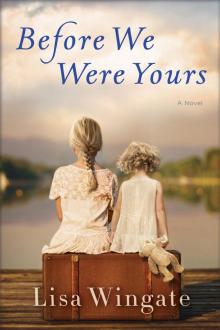 Before We Were Yours
Before We Were Yours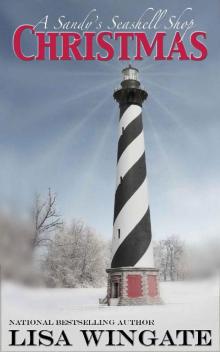 A Sandy’s Seashell Shop Christmas
A Sandy’s Seashell Shop Christmas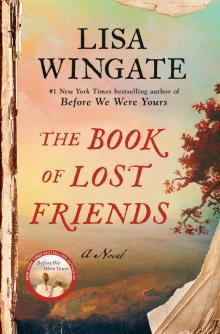 The Book of Lost Friends
The Book of Lost Friends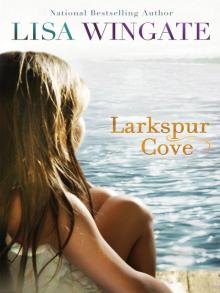 Larkspur Cove
Larkspur Cove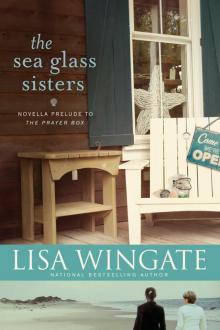 The Sea Glass Sisters
The Sea Glass Sisters The Language of Sycamores
The Language of Sycamores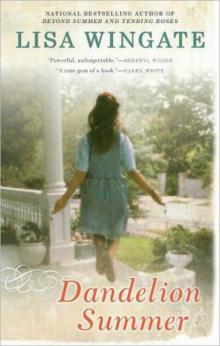 Dandelion Summer
Dandelion Summer Word Gets Around
Word Gets Around Beyond Summer
Beyond Summer Firefly Island
Firefly Island The Tidewater Sisters: Postlude to The Prayer Box
The Tidewater Sisters: Postlude to The Prayer Box Talk of the Town
Talk of the Town![Blue Sky Hill [01] A Month of Summer Read online](http://i1.bookreadfree.com/i1/03/29/blue_sky_hill_01_a_month_of_summer_preview.jpg) Blue Sky Hill [01] A Month of Summer
Blue Sky Hill [01] A Month of Summer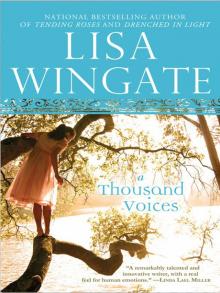 A Thousand Voices
A Thousand Voices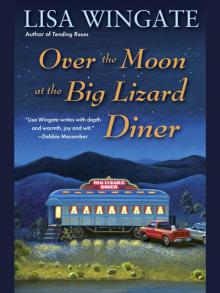 Over the Moon at the Big Lizard Diner
Over the Moon at the Big Lizard Diner Never Say Never
Never Say Never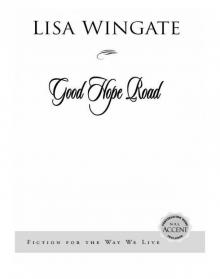 Good Hope Road
Good Hope Road The Summer Kitchen
The Summer Kitchen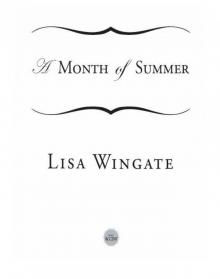 A Month of Summer
A Month of Summer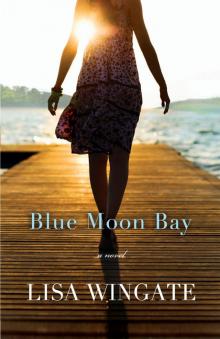 Blue Moon Bay
Blue Moon Bay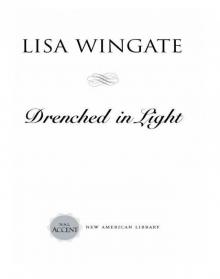 Drenched in Light
Drenched in Light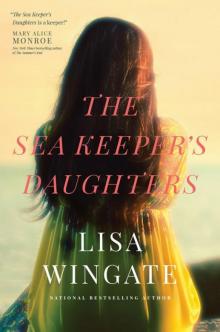 The Sea Keeper's Daughters
The Sea Keeper's Daughters